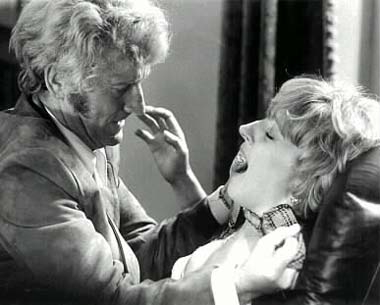Well, Fuck You, Too
"Frenzy" and "25th Hour"

I find it fascinating, given the nearly twenty films that I've seen this semester in my class on Alfred Hitchcock, how little the director's interests changed during his fifty years of filmmaking. By 1972, he was still interested in the concept of the double persona within one individual, with characters drinking brandy, with staircases, with his guilt over his love for food, with his focus on falsely accused individuals, and with murdering someone through strangulation. But with “Frenzy” (1972), the first film that he made without having to worry about censors (it is his only R-rated film), all of these obsession are taken to a more extreme level.
The story is a Hitchcock staple: a troubled guy is falsely accused of murdering a woman, and he must work against authority figures in order to prove his innocence. But without the need to work against censors, which often forces a filmmaker to resort to more creative means, Hitchcock was free to depict his rather disturbing fascination with strangulation in a more graphic manner. The potential downside to this new-found freedom is that a filmmaker can go too far, and push the envelope when modesty may work best. What's remarkable about “Frenzy” is that Hitchcock, with the exception of a grating sequence involving a detective's wife bringing out disturbing-looking plates of food for dinner, knows when and when not to employ these new, more explicit filmmaking tools for the greatest effect.
“Frenzy” is not one of the director's best works: his characters aren't all that memorable, and he has explored this kind of story before – the film has a rather tired feel. (Admittedly, I may feel this way because the film was shot in the 1970s, when people and clothes were really ugly, and with an intentionally desaturated look, but I digress.) What Hitchcock offers us is a decent film with a few brilliant flourishes. Such moments as the notoriously brutal and unflinching murder sequence, where a “nice” guy gives in to his more violent impulses, and rapes and strangles a nice marriage counselor with his necktie, serve as a reminder that Hitch, even in his old age and his poor health, was a one-of-a kind filmmaker. I can't think of any other director who could assault his viewers with a horrible rape sequence, and have them love him all the more because of it.

“25th Hour” (2002), which stars Edward Norton as a former drug dealer, named Monty, who is about to go to prison, is only the third Spike Lee movie that I've seen – I now regret having seen so little of his work. It's a long and challenging film, but it's efficiently edited, well shot by the cinematographer Rodrigo Prieto, and so unusually compelling that it generally avoids its own potential pitfalls. “25th Hour” was filmed in New York during the aftermath of the Sept. 11 attacks, and Lee parallels the destruction, and reconstruction, of Ground Zero with the downfall and reconstruction of Norton's troubled character.
Lee is a bold filmmaker. He risks de-railing his narrative with a ten-minute rant, in which Monty, venting his director's frustrations - “Send those Enron assholes to jail for fucking life!” - gives an exasperated “fuck you” to just about every aspect of and person in New York. It's an unusual and self-reflexive sequence, but I think it's all the more stunning for those very reasons. I could imagine some viewers hating the sequence, particularly because it feels so arbitrary. But it really isn't - “25th Hour” is as much a testament to how Lee loves and hates his city as it is for Monty.
“Frenzy” First Viewed: 12/10/08, on DVD - IMDb
“25th Hour” First Viewed: 12/9/08, on DVD - IMDb
Note: I forgot that "25th Hour" is actually based off of a novel. Monty's rant is taken verbatim from the book. Nonetheless, I feel that Spike Lee could relate to the issues that the rant addresses, which is why it feels so powerful and personal, in my opinion.

No comments:
Post a Comment